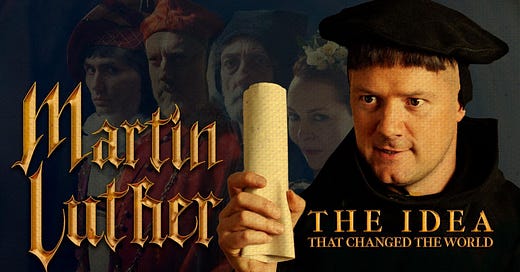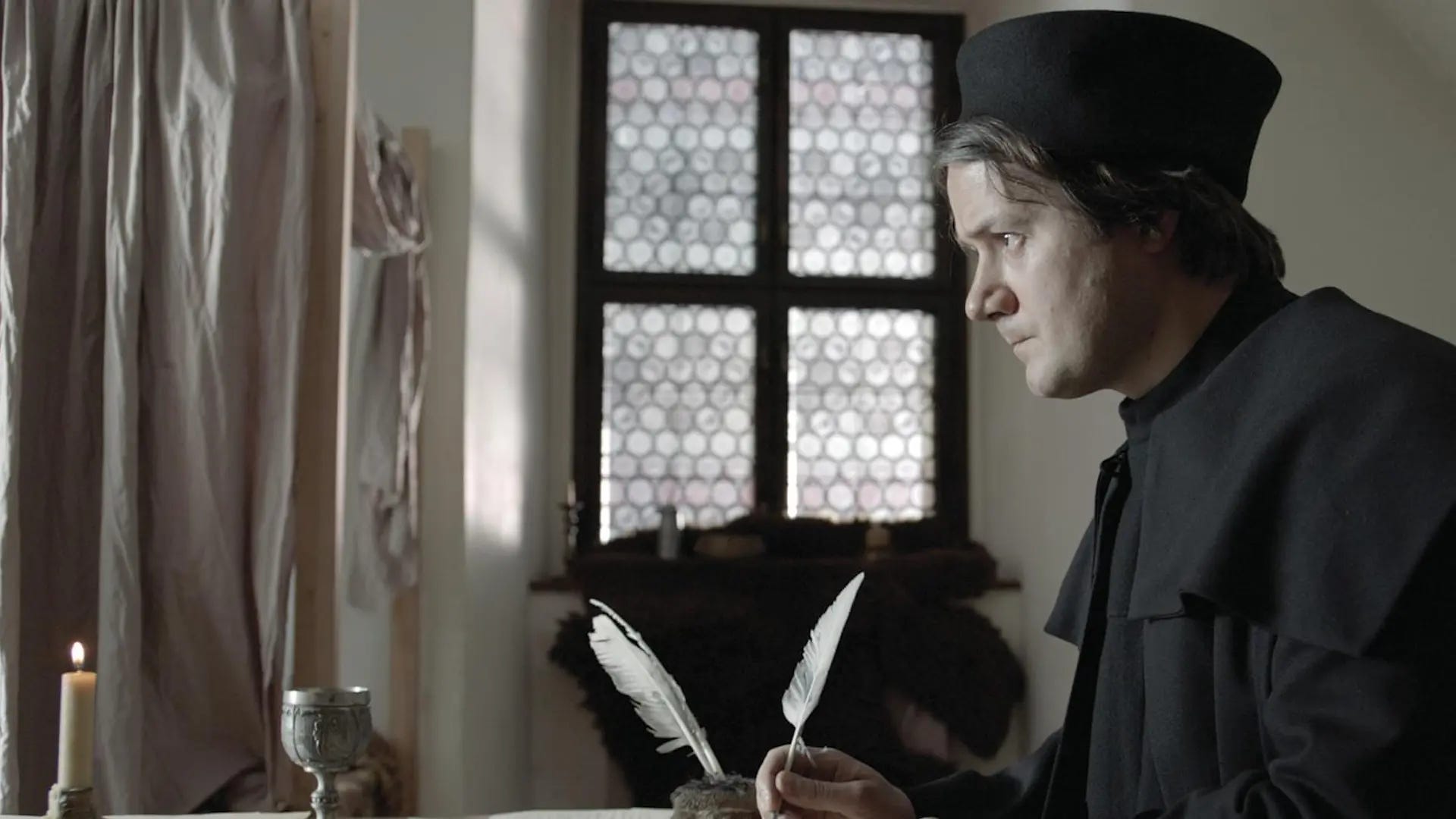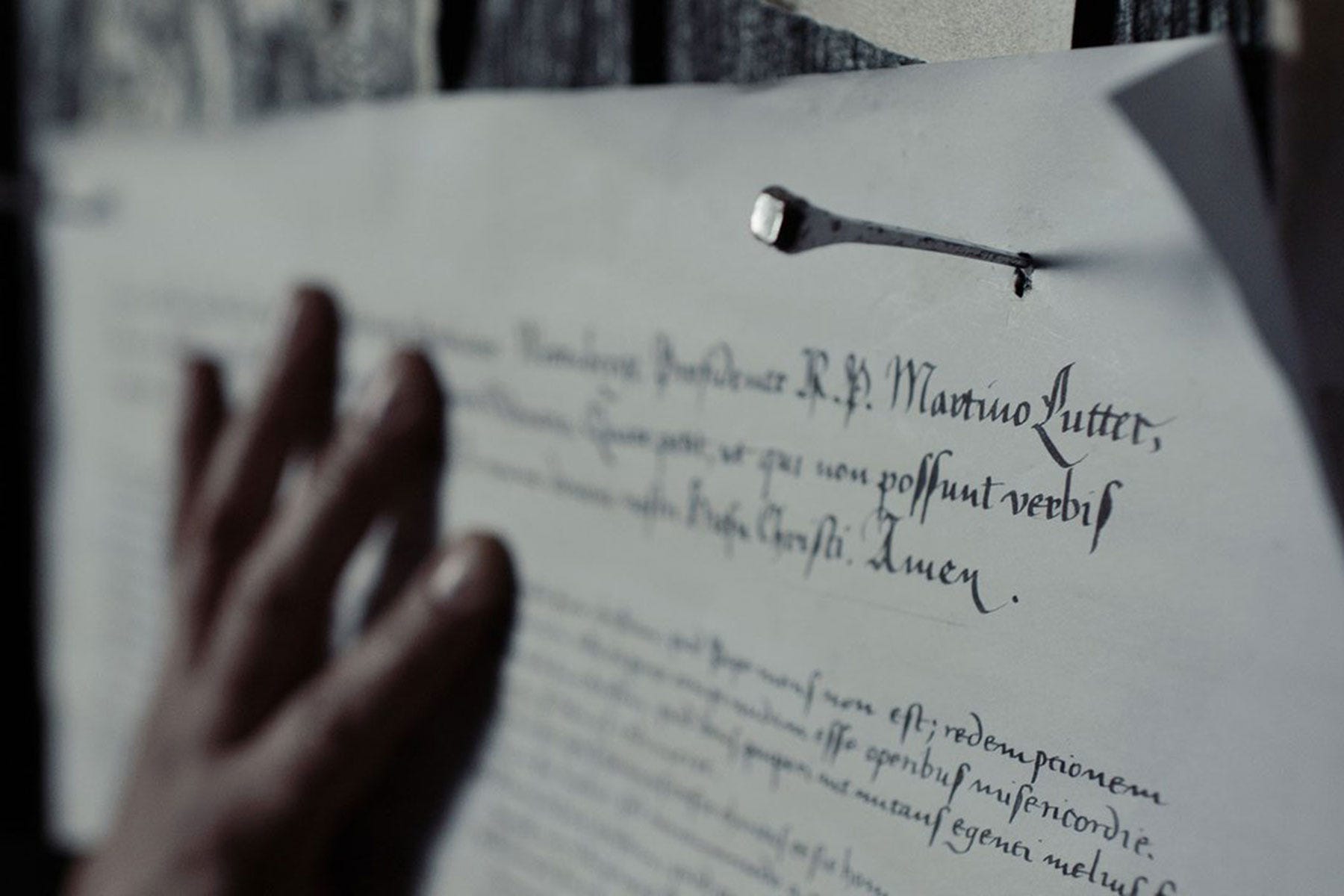Preface
In my career to achieve academic degrees, I have learned that there are many ways to write. One new way I have learned this year is “Analytical Review”. This article is a review I made about the documentary Martin Luther: The Idea that Changed the World. If you want to watch this movie for free, click here on Tubi's website. If you enjoyed this kind of content please let me know below in the comments or a simple like will do the trick.
When a speculative person looks around themselves in the twenty-first century and wonders ‘how did humanity arrive here?’ The answer they seek can be distilled down to one man, Martin Luther. He started a movement, then a resistance, and initiated an entire reformation. Boettcher/Trinklein Inc. aired their documentary on these events, which Martin Luther started. This film was created 500 years after he nailed his ninety-five theses to the castle church door on Hollow Eve’s night, October 31st, 1517. The documentary’s primary focus is Luther while still signifying the spark he manifested in igniting the dry tinder known as the Protestant Reformation. Another detail exemplified in the documentary was how Luther’s ideas would transform Christendom, Christianity, and Western society as a whole. Mike Trinklein, the author of the film, asserts his hypothesis that Luther challenged the Catholic church’s authority and irrevocably reshaped the paradigms of religious and political structures forever.
A key theme displayed throughout the film was the impact of the printing press. This leap forward established Martin Luther as the first celebrity. The thousands of prints developed due to the high demand showcased the mere cracks to large chasms between Luther’s and the Church’s diametric theologies. This by-product of notoriety had been unforeseen motives for reform in the church but led to religious conflicts and denominational splintering. No one had spoken against the Pope so adversely, and continued walking around town like it was no big deal. Luther’s story will continually need to be told to make those unaware begin to comprehend his impact.
The first scene of the documentary starts by instructing the viewer that all the words spoken by the actor playing Martin Luther were verbatim to his writings or public dialogues. This attention to detail automatically establishes a tone for accuracy that the film attempts to reproduce. Martin Luther: The Idea that Changed the World’s creators were able to stay true to the original tone by using historical reenactments pivotal in Luther’s life, quoting primary sources, and displaying expert analysis. While some might have stopped there, the producers even included visual aids like maps and artwork that brought these fantastical events into a post-modern perspective. Context is crucial for audiences to engage appropriately with foreign concepts or need proper hermeneutics. While these aids are purely for the viewer's benefit, they can dramatize events in a way that oversimplifies complex historical events. The Catholic perspective is severely downplayed, with only a tiny minority of the experts belonging to the ‘Mother’ church. Even without equivalent sources from each side of the ravine, the writer artfully characterized both sides to appropriate and respectful degrees. Neither denigrating the Catholic church nor glorifying Luther in his actions.
Presentation throughout the film was kept in chronological order. It is structured to guide viewers through Martin Luther’s life and hone in on contemporaneous Reformation events. Articulated early in the film, Trinklein directly quoted Luther. However, the literal nature created a non-organic atmosphere that could be interpreted as off-putting or ill-fitting. The general narrative style would consist of dramatized reenactments that developed into an academic discussion of pertaining events, effectively engaging viewers. Inconsistent with the other aspects of the documentary that were polished, the use of evidence was lacking due to the generalizations about Luther’s motives. One example is Luther’s early life; his domineering father was emotionally and physically abusive, not even to mention his mother, Margarete Luder. She was also a harsh disciplinarian. These early motivations and others that would impact Luther’s psyche could have produced a further nuanced presentation of the man.
Martin Luther has become a fascination of mine lately, so I have spent time learning more about the person's historicity compared with the legends. Earlier, I alluded to the actor playing Luther, Padraic Delany, as taking me out of the experience with the enunciation of his lines. At first, I thought that this was due to the nature of the script being ripped verbatim from the original sources by Luther himself, which had been written five hundred years earlier. Unfortunately for Delany, this is not the case because I have also been listening to a podcast that began publishing episodes in 2020 about Luther and his dynamic career. The podcast is titled Martin Luther: In Real Time; their shtick is publishing episodes to the day half a millennium later when Luther would have been asynchronously experiencing them. Rupert Wickham proves my original theory wrong with his rendition of the famous reformer.
Another key component of Martin Luther’s character I learned from this documentary was how Luther spoke. His vernacular could have elated the most pious heart, but on the other hand, his vulgarity could make even the earlier brutish Mongols blush. At the same time, many forms of media have been created to display Martin Luther and his legendary status, none that I have consumed included to the degree this documentary did in showcasing his versatility with oral and written language. To onlookers from a twenty-first-century perspective, Luther’s boorish word choice and analogies would appear overtly offensive and demeaning. Contrary to postmodernity's root in culture to establish a subconscious worry about how a person may be offended by specific speech, Luther felt no such empathy. Instead, he spoke the tongue of the people and made euphemisms that created mental portraits that captivated pre-enlightenment commoners to grasp complex theological concepts fully.
As a documentary aimed to represent Martin Luther’s life and how his understanding of salvation sparked a global change, Martin Luther: The Idea that Changed the World successfully accomplished its goal. From the chronological framework to balancing dramatization with the historians' analyses, the producers created a captivating film worthy of awards. Enabling a broader audience to watch this documentary with no necessary peripheral awareness of the context in sixteenth-century Western Europe allows more people to know one of history’s greatest movers. The United States would not be what it is today without the groundwork performed by Luther. This is why people of all nationalities and creeds should take care and learn about how humanity arrived at its current condition. That is why I am thankful that Boettcher/Trinklein Inc. created such a powerful film that portrays how pivotal Martin Luther was to Christianity, Western Europe, and the world.






